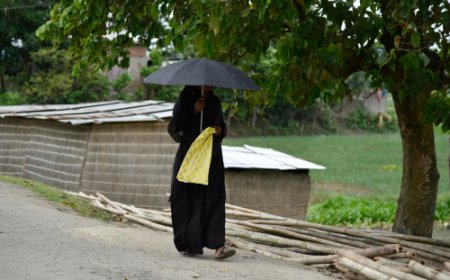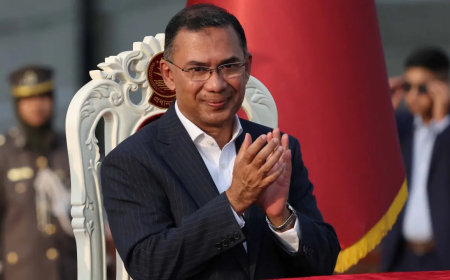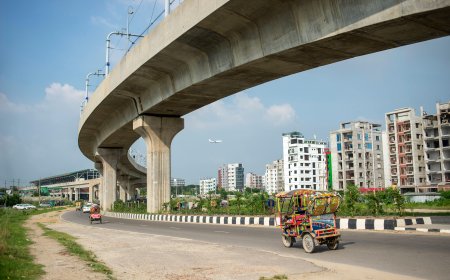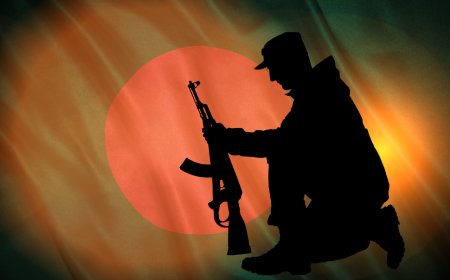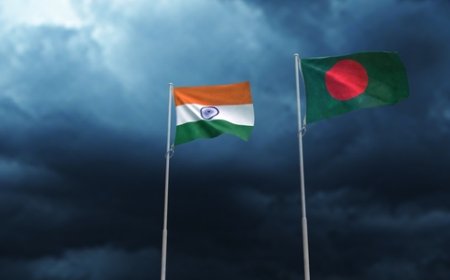Neighborhood First? Hardly.
A functional India-Bangladesh relationship -- built on mutual respect and interests -- is an economic and geo-strategic imperative. Otherwise, India’s fears of “strategic encirclement” risks becoming a self-fulfilling prophecy.

At a moment when India’s “Neighborhood First” policy is fraying and regional connectivity is essential to weather economic shocks and global instability, the dramatic deterioration of New Delhi-Dhaka relations has become a critical test of India’s long-term strategic judgment.
Since the ouster of Sheikh Hasina’s 15-year government in August 2024, ties between the two countries have unraveled with unusual speed.
The rupture deepened after Bangladesh’s International Crimes Tribunal sentenced Hasina to death for crimes against humanity and demanded New Delhi to honour its extradition commitments under the bilateral treaty.
Suspicion in New Delhi toward Dr. Muhammad Yunus’ interim administration has only hardened.
Today, India-Bangladesh relations are at their most fragile point in decades, posing serious implications for India’s regional diplomacy and security posture.
Undermining Regional Trade
An already uneasy relationship between New Delhi and Bangladesh’s Interim Government soured further when India abruptly cancelled Dhaka’s transshipment facility in April -- a move widely seen as strategically shortsighted.
Responding to pressure from Indian apparel exporters, New Delhi revoked Bangladesh’s right to ship goods to Nepal, Bhutan, and Myanmar.
This follows the finalization -- but not implementation -- of the long-delayed BBIN Motor Vehicles Agreement (MVA).
Bangladesh responded with retaliatory bans on select Indian, Nepali, and Bhutanese products. India countered by restricting seven categories of Bangladeshi exports through its land ports, including readymade garments and plastics. New Delhi has also recently imposed land and sea port restrictions on jute products from Bangladesh.
While trade volumes are modest, Bangladesh’s exports to Nepal and Bhutan had been steadily increasing, with an annualized 8.7% growth to Nepal from 2017 to 2022.
Land-based routes are crucial; air cargo cannot replicate the scale or affordability. As for Myanmar, conflict-driven instability and control by non-state actors in bordering regions continue to impede trade.
The China Factor
India’s move seems driven not only by trade concerns but by growing unease over China’s deepening ties with Bangladesh.
Dr. Yunus’ state visit to Beijing included calls to connect Yunnan and Northeast India to global markets via Bangladesh’s deepwater ports, including the Chinese and Indian-funded Port of Payra.
Despite Dhaka’s reassurances that this vision aims to boost regional trade, New Delhi remains wary -- particularly given its $100 billion trade deficit with China and suspicions about Chinese economic encroachment.
Strategic Overreaction to Geo-political Realities
New Delhi was further alarmed by unconfirmed reports that Dhaka offered to let China help build an airbase in Lalmonirhat, near India’s restive Northeast. The base would allegedly be constructed by a Pakistani firm, stoking fears of “strategic encirclement.”
India has long viewed its Northeast -- marked by secessionist insurgencies and ethnic unrest -- as a military and geostrategic vulnerability. Yet even if such a base were constructed, its utility in a military confrontation is highly questionable.
India possesses advanced rocket artillery, ballistic missiles, and total naval supremacy. Analysts have long postulated that any Chinese military capabilities along its border with India are primarily designed to draw India’s more limited resources away from China’s maritime vulnerabilities.
Yet despite practical constraints, India already possesses the capability to disrupt Chinese shipping through the Straits of Malacca through its tri-force bases in the Andaman islands. Likewise, the completion of a $3.6 billion dollar underground nuclear submarine base in Andra Pradesh will cement its control over the Bay of Bengal.
It is hard to imagine China -- or Bangladesh, for that matter -- risking expensive hardware and trained personnel just to give Indian politicians and war planners temporary blushes and headaches.
The geo-political and military implausibility of this alleged airbase plan echoes other dubious allegations -- such as Sheikh Hasina’s unsubstantiated claims about US plans for a naval base on St. Martin’s Island.
Similarly, Bangladesh’s recent purchase of Bayraktar TB2 drones for border surveillance triggered immediate Indian countermeasures, despite the drones posing minimal threat to India’s near-total aerial supremacy.
Beyond any kinetic actions from New Delhi, Dhaka surely knows that it would invite a raft of other non-military retaliatory measures, capitalizing on the unique vulnerabilities Bangladesh faces.
India can once again hamper or outright shut off electricity supplies, restrict river sharing and water resources, and further curtail or outright restrict land and maritime trade.
India can also leverage its networks and influence within Bangladesh to destabilize the interim government, including reinstating support for insurgent groups in Bangladesh’s restive Chittagong Hill Tracts. Bangladesh and China both know that they would incur disproportionate risks in escalating tensions with India.
Rather, Bangladesh’s reported interest in acquiring J-10C fighter jets, upgrading its air defense systems reflects domestic pressure to deter repeated Myanmar airspace and overhauling the country’s dangerously decrepit fighter fleet.
Likewise, plans to purchase South Korean KSS-I submarines is designed to bolster maritime security to address regional and international threats while participating in multilateral missions.
Bangladesh’s invitation for Turkish defense companies to develop Bangladesh’s nascent military-industrial complex represents a long-overdue priority of defense modernization, with Turkey being a defense natural partner given its track record in South Asian markets and its willingness to transfer technology to partners.
Consternation from voices in India myopically overlooks Bangladesh’s legitimate defense needs, as well as Dhaka’s diverse range of defense partners from the US to Japan.
All of these steps are taking place in the backdrop of other countries in the region navigating this heightened state of tensions between India and Pakistan, and are designed to shore up national defense, not threaten Indian dominance.
Domestic Politics Over Geo-strategic Interests
Yet India continues to frame such developments as existential threats. The real driver of its punitive policies seems to be its domestic politics.
Anti-Bangladesh rhetoric has long resonated with voters, and Indian politicians have been all too willing to play up these sentiments, despite the foreign policy ramifications.
For instance, even during Sheikh Hasina’s decidedly pro-India tenure, senior BJP officials regularly used inflammatory language.
Retaliatory measures like this seem to primarily serve a domestic purpose -- as political cover for New Delhi’s short-sighted policies of coercion against Bangladesh and Nepal, as well as its longstanding domestic and regional leadership failures at a critical time for the region.
While Japan, South Korea, and China have tabled longstanding tension points in their relationships to commit to greater regional trade integration in an united response to the Trump administration’s new tariff regime, India is throwing up trade barriers and restricting connectivity with its immediate neighbors.
New Delhi will consequently lose further credibility as a reliable and trusted partner in the region. If it fails to establish at least decent relations with Bangladesh and Nepal, its vaunted "Neighborhood First" policy will be revealed as a hollow shell with massive vulnerabilities.
A Self-Inflicted Strategic Setback
Such moves will prove to be profoundly short-sighted and self-defeating, especially as both Beijing and Islamabad ramp up their outreach and relations with Bangladesh.
While Beijing was initially pragmatic and cautious after losing a relatively strong partner in the Hasina regime, it has praised the student-led movement that overthrew the Hasina regime and ultimately created the new National Citizen Party.
China has also courted Jamaat-e-Islami and other parties, the military, and other key stakeholders. While Dr. Yunus’s request to meet with Modi prior to BIMSTEC summit went unanswered -- which Bangladesh will chair for the next two years -- Beijing rolled out the red carpet for Dr. Yunus’ state visit.
Likewise, Pakistan is re-establishing air and sea links with Bangladesh, while bolstering educational exchanges and military cooperation.
On many levels, the contrast in India and Pakistan’s diplomatic fortunes over the last year is remarkable. The evolution and ramifications in the medium and long-term will continue to surprise in many ways, while also being a natural consequence of their approaches.
On many levels, Pakistan's diplomatic wins seem remarkable. The country was facing years of domestic upheaval and deep divisions after the overthrow and jailing of Imran Khan.
Yet these internal cleavages don't seem to have impacted their ability to strengthen relationships with existing allies while forging new ones.
In many ways, Asim Munir and the military's ascension perhaps created an ideal partner for authoritarian regimes in not just long-term allies in Beijing, Riyadh, and Abu Dhabi, but to also build new ones with Tehran and most dramatically, Moscow.
It has arguably even been helpful in fostering a relationship with Washington. A key strategy involved by Islamabad is their willingness to serve as a junior partner to these regimes, foreign personal leadership-level ties, and deftly appealing to their long-term strategic interests and playing them off each other as needed.
While time will dictate the strength, nature, and long-term viability of some of these newer relationships, the fact that they are happening at all is quite a coup for Islamabad.
In contrast, India's approach seems to have maintained the status quo with long-term allies at best, while alienating potential and even long-time allies. New Delhi has maintained relations with Moscow, and enhanced economic and military ties with Tel Aviv.
Yet relations with Dhaka and Washington have dramatically nose-dived. Even diplomatic wins in Sri Lanka and Maldives have been heavily contingent on economic packages and incentives to both countries, and could swing back in subsequent administrations.
Most interestingly, New Delhi is seeking to pursue greater economic ties and cooperation with Beijing in the face of US tariffs. While the results of these overtures remain to be seen, the messaging in Colombo, Male -- and most of all, Dhaka -- is jarring.
New Delhi's strategy of countering "strategic encirclement" by China and using both inducements and coercion against its neighbors to do so -- while simultaneously trying to enhance economic ties with Beijing -- will seem profoundly inconsistent and incoherent-if not downright schizophrenic and hypocritical.
The contrast in both country's diplomatic fortunes over the last year is remarkable. The evolution and ramifications in the medium and long-term will continue to surprise in many ways, while also being a natural consequence of their approaches.
Domestic Politics Over Strategic Objectives
Indeed, India’s foreign policy toward Bangladesh is marked by profound hypocrisy. Indian policymakers and commentators malign Dhaka for strengthening ties with the US, China, Turkey, Saudi Arabia, Qatar, and even rebuilding ties with Pakistan.
Yet Dhaka, Kathmandu, and other countries in the region have starkly noted that India itself has drawn closer to Russia, Israel, the UAE, and has even sought to revamp ties with China at least to some degree.
One can argue that this is a textbook case of “do as we say, not as we do” neocolonial realpolitik.
This double-standard has fueled a crisis largely of New Delhi’s own making. By placing all its bets on a brutal, kleptocratic regime in Dhaka, India predictably alienated both the Bangladeshi government and its people.
Rather than seizing the chance to work with Dr. Muhammad Yunus -- the most pragmatic and internationally respected leader it could have hoped for -- India has doubled down on punitive measures, effectively setting fire to its own “Neighborhood First” policy.
The irony runs deeper. Having abandoned its historic leadership of the Non-Aligned Movement, India has pursued military and strategic partnerships with Russia, Israel, the UAE, and China.
Yet it chastises Bangladesh for pursuing similar diversification. In reality, Bangladesh is navigating the same uncertain waters India is, particularly under the shadow of an unpredictable US administration.
Nuanced statecraft and respect for neighbors don’t win votes. Domestic politics now drives New Delhi’s diplomacy, producing a PRC-esque “wolf warrior” posture in South Asia that undermines regional stability.
This politicization of foreign policy has ripple effects beyond Bangladesh. India has largely abandoned its longstanding support for Palestinian statehood -- once a key source of goodwill across the Middle East and wider Muslim world -- in favour of deepening military ties with Israel.
While that has yielded some defense benefits, an equally important purpose is political: Appeasing the Hindutva base.
The cost, however, is strained relations with Saudi Arabia, Qatar, Iraq, and other Gulf states -- ironically, the same countries that provide India with vital remittances and energy.
Cooling Tensions
Dhaka has a role to play in easing tensions in the India-Bangladesh relationship. Its retaliatory trade ban may address domestic demands for a response, but it undermines the country’s broader, long-term economic interests.
As evidence emerges of ousted Prime Minister Sheikh Hasina’s direct command responsibility for large-scale state violence inflicted on protesters in 2024, Bangladesh feels compelled to ask New Delhi to extradite Hasina.
This is especially true given Dhaka has extradited Indian rebels back to India, and the Interim Government feels a particular need to be accountable to the public in this transitional period of Bangladesh’s history.
While Dhaka may not be able to back away from this, it may offer other concessions to offer New Delhi the breathing room needed to engage with Dhaka on more substantial issues.
Nevertheless, the most damaging decisions to regional integration thus far have come from New Delhi. If India continues down this path, its dream of regional leadership will ring hollow.
For instance, Bangladesh’s acceptance of China’s offer to counter disinformation was driven by large-scale disinformation campaigns targeting Bangladesh’s post-Hasina government originating from India supported from global far-right elements.
Rather, a functional India-Bangladesh relationship -- built on mutual respect and interests -- is an economic and geo-strategic imperative.
Otherwise, India’s fears of “strategic encirclement” risks becoming a self-fulfilling prophecy.
South Asia desperately requires stability and greater cooperation -- if not outright connectivity and solidarity -- in the face of unprecedented economic challenges and regional conflicts.
Anything less would not only signal a failure of Indian leadership, but also mark a collective setback for a long-neglected yet strategically vital region -- home to over two billion people and immense untapped potential.
Atif Choudhury is Founder and CEO of the US-Bangladesh NextGen Fellowship & Policy Institute, a Non-Resident Fellow at the Vanderbilt Center for Global Democracy, a Non-Academic Fellow at the University of South Carolina Rule of Law Collaborative, and an Academic Relations Strategist at the Qatar Cultural Attache Office in Washington DC.
What's Your Reaction?













